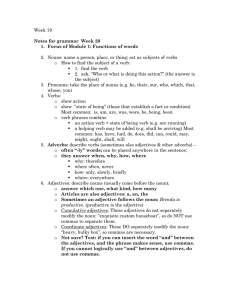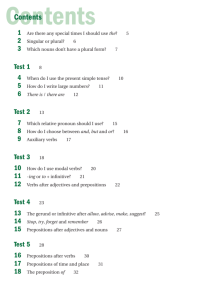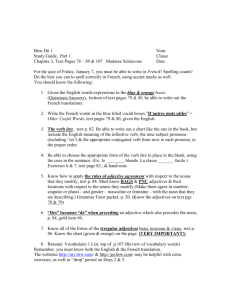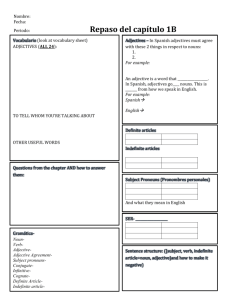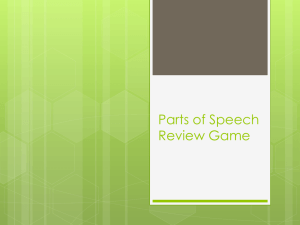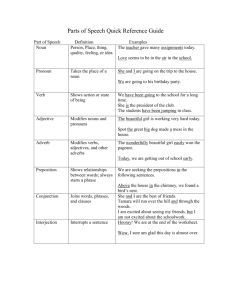Week 19 Vocabulary Stories and Grammar Notes
advertisement
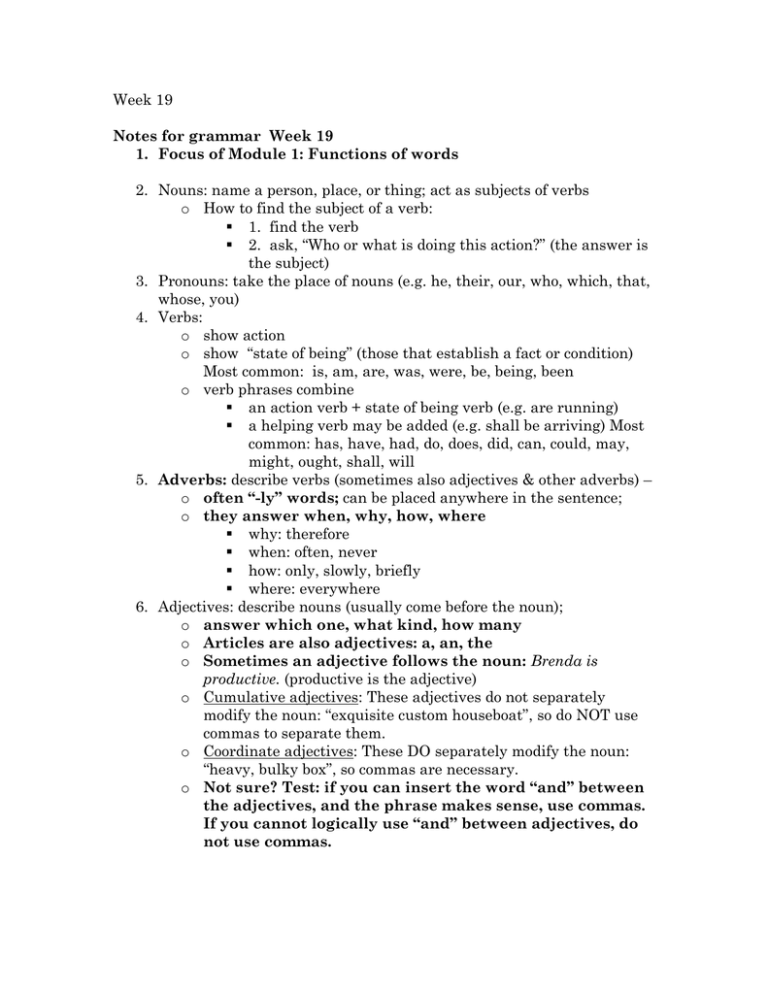
Week 19 Notes for grammar Week 19 1. Focus of Module 1: Functions of words 2. Nouns: name a person, place, or thing; act as subjects of verbs o How to find the subject of a verb: 1. find the verb 2. ask, “Who or what is doing this action?” (the answer is the subject) 3. Pronouns: take the place of nouns (e.g. he, their, our, who, which, that, whose, you) 4. Verbs: o show action o show “state of being” (those that establish a fact or condition) Most common: is, am, are, was, were, be, being, been o verb phrases combine an action verb + state of being verb (e.g. are running) a helping verb may be added (e.g. shall be arriving) Most common: has, have, had, do, does, did, can, could, may, might, ought, shall, will 5. Adverbs: describe verbs (sometimes also adjectives & other adverbs) – o often “-ly” words; can be placed anywhere in the sentence; o they answer when, why, how, where why: therefore when: often, never how: only, slowly, briefly where: everywhere 6. Adjectives: describe nouns (usually come before the noun); o answer which one, what kind, how many o Articles are also adjectives: a, an, the o Sometimes an adjective follows the noun: Brenda is productive. (productive is the adjective) o Cumulative adjectives: These adjectives do not separately modify the noun: “exquisite custom houseboat”, so do NOT use commas to separate them. o Coordinate adjectives: These DO separately modify the noun: “heavy, bulky box”, so commas are necessary. o Not sure? Test: if you can insert the word “and” between the adjectives, and the phrase makes sense, use commas. If you cannot logically use “and” between adjectives, do not use commas. 7. Degrees of comparison with adjectives o comparing two things? Use the comparative form of the adjective “-er” “less” or “more” o comparing more than two things? Use the superlative form of the adjective: “-est” “least” or “most” o Use less/least & more/most when the adjective has three or more syllables* multiple-syllable adjective: more superstitious single-syllable adjective: faster *There are exceptions to this rule: two-syllable adjectives vary 8. Prepositional phrases: begin with a preposition & end with a noun (“over the hill”) English Prepositions List There are about 150 prepositions in English. Yet this is a very small number when you think of the thousands of other words (nouns, verbs etc). Prepositions are important words. We use individual prepositions more frequently than other individual words. In fact, the prepositions of, to and in are among the ten most frequent words in English. Here is a short list of 70 of the more common one-word prepositions. Many of these prepositions have more than one meaning. Please refer to a dictionary for precise meaning and usage. aboard besides into than about between like through above beyond minus to across but near toward after by of towards against concerning off under along considering on underneath amid despite onto unlike among down opposite until anti during outside up around except over upon as excepting past versus at excluding per via before following plus with behind for regarding within below from round without beneath in save beside inside since English 12 Week 19 Vocabulary & Grammar TEND/TENT (to stretch, extend, spread) PEND/PENS (to hang, weigh, or cause to hang down) Professor Gillyputty presented a tendentious lecture that most of his classes thought portended a contentious college semester. Rather than expend their energy arguing with him, they simply demanded that the dean refuse to pay his stipend. However, the dean was an appendage of Prof. Gillyputty and had the propensity to cave to his faculty’s demands. Still, the students plan to fight back and squeeze the line of favoritism so it distends and bursts! English 11 Week 19 Vocabulary & Grammar ANIM = breath, soul FIG = to shape or mold Jasmyne’s face was more animated than I’d ever seen when she breathlessly told us how the Prime Minister was burned in effigy in the town square. The animosity of the crowd scared her. The configuration of the buildings around the square allowed onlookers to witness the event. Then the magnanimous general arrived, and the crowd thought he was a figment of their collective imagination. But he was real. He used figurative language in his speech to the crowd, which made them wonder whose side he was on. Prior to this event, Jasmyne felt inanimate ---like she was dead--, but now she’s been stirred to action. English 9 Week 19 Vocabulary & Grammar BELL = war PAC/PEAS = peace George was a pacifist who made an unusual unfortunate pact. He readily agreed to appease his bellicose first wife, Sally, by granting her greater access to his bank account than she ever had before. This would not pacify her because her belligerence toward him was profound. George was like Rhett Butler who, in the antebellum South, fell for the beautiful, duplicitous Scarlett O’Hara.

